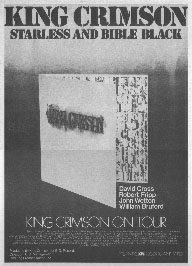![]()
  |

Starless and Bible Black
King Crimson
Island ILPS 9275
Released: April 1974
Chart Peak: #64
Weeks Charted: 11



 Just as they were about to be classed among the living relics, Robert Fripp and friends have returned from a lengthy creative hiatus with an inventive new album. They've taken the disjointed pieces of Larks' Tongues in Aspic, infused them with some life, and woven them into a package as stunningly powerful as In the Court of the Crimson King, the LP that launched "mellotron rock."
Just as they were about to be classed among the living relics, Robert Fripp and friends have returned from a lengthy creative hiatus with an inventive new album. They've taken the disjointed pieces of Larks' Tongues in Aspic, infused them with some life, and woven them into a package as stunningly powerful as In the Court of the Crimson King, the LP that launched "mellotron rock."
Crimson displays a certain confidence here that hasn't before graced its efforts. William Bruford's multifaceted percussive offerings are particularly impressive in this light -- he's finally mastered his distinctively eclectic style. David Cross's violin and viola are woven into the Crimson tapestry far more effectively than before, adding the counter-soloist that Fripp needed to give variety to the band's sound.
 Click image for larger view. |
- Gordon Fletcher, Rolling Stone, 6/6/74.
Bonus Reviews!
A bitterly disappointing effort from Fripp and Company. Aimless, amorphous rock with abysmal lyricism and uninspired instrumentation. Perhaps it will improve afer a dozen listens (some LPs do), but initially, this one's a dud from the word go. *
- Ed Naha, Circus, 8/74.
Bob Fripp and his band know more ways to be intelligent, dead serious, and fairly boring than anybody I know save for the Master of Musical Monotony himself, John McLaughlin. David Cross may well be the outstanding member of this group as he's the least competent on his instrument (violin), but all the others play their instruments with a same degree of technical proficiency. "The Great Deceiver" is the best and most interesting track on the album; in fact it may be the only listenable song produced by this King Crimson to date, but one good apple don't spoil the whole bunch.
- Jon Tiven, Circus Raves, 9/74.
This is as close as this chronically interesting group has ever come to a good album, or maybe it's as close as Robert Fripp ever come to dominating this chronically interesting group. As usual, things improve markedly when nobody's singing. The lyrics are relatively sharp, but there must be better ways of proving you're not a wimp than castng invective at a "health-food faggot." Unless you are a wimp, that is. B
- Robert Christgau, Christgau's Record Guide, 1981.
An intriguing follow-up to 1973's Larks' Tongues in Aspic, and overall the band's most satisfying album. * * * *
- Bruce Eder, The All-Music Guide to Rock, 1995.
![]() Reader's Comments
Reader's Comments
No comments so far, be the first to comment.
